Sagadahoc Stories #89:
Willows and Maples First
| So dry it squeaks. The vernal impulse aches to leaf out and blossom,
but where are the April Showers? Garden busting is a dance in
dust. It clouds over. The boatbuilder covers his materials. It
blows over. Another sunny day. Outdoor burning is banned statewide.
There's talk about another '47, the year Bar Harbor burned. |
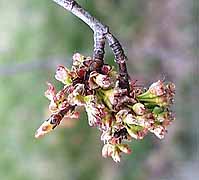
Maple buds
|
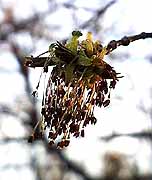
Box Elder
|
The trees are tingeing with anticipation, just the same, and first
comers are splitting their bud cases. Maples are blooming and
the willows in leaf. Species of the treeline, they know how to
get out into the sun early, Labrador or low water. Lilac buds
are swelling and the box elder is sporting its fanciful doodangles.
Beech sprouts are nudging up through the forest litter. Lettuce
is peeping. |
We went peeping over hill to Vermont this school vacation week,
and the high country is still clenched in late winter. Washington
and Adams are white mountains. Ice in the lakes, the woods stark,
the beige ungreened. We didn't find Spring again until we rolled
down into the Champlain Valley.
| Willy and Liz were making music at a street theater performance
in Burlington, so we went along for the show. A scored and choreographed
recitation of the history of local urban renewal, performed in
a downtown mall, in situ. A cadre of dancers with four foot tall
wooden houses executed symbolic routines in a corridor next to
The Gap, while shoppers trooped past with tunnel vision. Ethereal
music cascaded down escalators and echoed along the glass walls. |
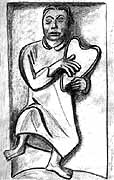
Dancer
(After Barlach)
|
The tale was of wholesale condemnation, arson, and clearcutting
of river housing, funded by federal largess in the 50s and 60s.
A familiar story. We remember being shown around Portsmouth, Virginia,
in '69 by a proud banker who bragged about removing the undesirable
elements from downtown. Color that Black. And green, of course:
it being very profitable to turn low income housing into prime
real estate.

Exile
(After Barlach)
|
One elderly ex-resident of the old neighborhood in Burlington
told us how it had been, as dancers deconstructed the scene. When
the text touched on the destruction of visual history it nudged
us. Bowdoinham is busy tearing down and improving its visual history,
thanks to the same deep pocket. Familiar forces are still busy,
renewing us into the bland.
|
One last hangover from the era of urban redevelopment continues
to plague Burlington. The terminal spur of interstate was supposed
to cut alongshore from South Burlington and debouch downtown.
Neighborhood groups have blocked it since the 60s, but contractors
and government boosters are trying again to make it happen. You
might get into town two minutes earlier, at the cost of cutting
off residential neighborhoods from the lake. What's the rush?
| You might ask the same of this burg. We seem determined to flatten
or deface our visual heritage. The old mill site now looks like
a demolition dump, with the big hopper keeled over like checkmate.
The dead plantings at Clearcut Landing have been relandscaped,
and our grandchildren might enjoy a little shade there. Peggy
and I circulated a petition to NOT uglify the Town Hall, and honor
its stark simplicity. We got over a hundred signatures, but it
remains to be seen what will happen at town meeting, where the
plan gets voted up or down. |
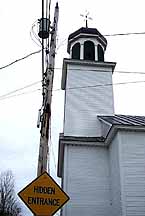
|
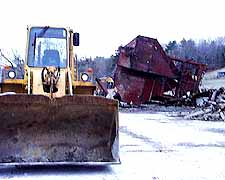
|
The other side of this grumble is the feeling of community action
and goodwill which goes into civic development. This Saturday
the landing was mobbed with citizens raking and planting and painting
and launching docks. Up at the school another volunteer crew was
building a Rec Building to sell snacks at ball games. A dozen
years ago it was the hairballs at Freak Beach who fixed up the
floats and moorings. No committees, no regulations, no authorities.
We just went out and bought paint and lumber and did it. Now another
generation of boatists is taking care of the landing, in a different
style. They even say the Harbor Master has put in for an official
boat. |
While I've got my oar in: I wonder how much of today's regulatory
imperative is self-defeating. We seem determined to legislate
rules for everything, and then call the cops. As an example, waterfront
conduct used to follow well-evolved standards, passed along from
generation to generation. I was told as a kid not to block the
front of the float, and to ship my oarlocks so they didn't gouge
my neighbor's boat. One gruff comment from a fisherman taught
me that lesson for life.
| The idea was that intelligent behavior, once made apparent, would
guide your decision-making. If you insisted on leaving your skiff
on the front of the float, it might go adrift, of course. Social
sanctions were direct. You were expected to internalize acceptable
behavior and be responsible for your acts. Now Jimminy Cricket
is dead. Instead of conscience and good sense we have ordinances
and authorities. Nobody seems to want to learn what works from
the old hands, or inform their own best judgment. Traditional
patterns of sociable behavior are invisible, and the Bozos don't
know they exist. Do what you please and watch out for the heat.
Now, if I cut you adrift for being a bonehead, I'll get arrested. |
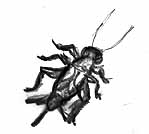
|

Joseph
|
The upshot of an authoritarian mentality may be the loss of moral
self-responsibility. Depend on the rod and spoil the society.
Externalize social standards, call the cops, and you replace a
healthy conscience with controlled paranoia. You don't do what
you understand to be right, you do what you are told. In fact,
what's right is what the authorities tell you. Apply a lack of
conscience to violent behavior and you get high school massacres.
Maybe you can't blame sociopathology on authoritarianism, but
they look like mirrors to me. |
Over in Vermont we also stopped at SignalZ in Mont P, to get an
eyeful of spaceship earth. Dave and Anci, our Mac gurus, are out
there on the digital frontier and their workplace looks like the
bridge of the Starship Enterprise, with G3s. It's always exciting
to touch down on the cutting edge and have your head spin. Montpelier
is a sleepy mountain outpost, about the size of Brunswick, spiced
with government workers and lawyers. An unlikely place for high-tech
hotshots, but it's a decentralized universe out there. We came
away from the hub with our heads full, and some good hugs.
| Descending back into Maine you feel the coastal effect soften
the air. More daffs, early tulips, fresh painted lawn ornaments.
This province always looks a bit seedy after the Northern Kingdom.
Fewer pastures and mountain vistas, more log lots and puckerbrush.
The devastation of last year's ice storm on the eastern slopes
and along the Androscoggin is still obvious. Tracts of topless
woodlots and acres of crippled birches look ravaged in April nakedness. |

|
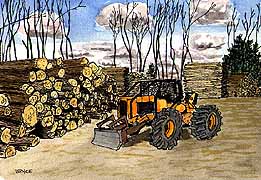
Log Yard
|
Soon as we lit to home I got to mold making again. Trying to pick
out the oak to use for framing this frigate, figure out how to
bend on the hard curves of the chines. After much plank flipping
I went back over to Eric's to get more oak. Nice clear curved
pieces to ease the bending. Eric's yard is piled high with logs
from his winter cutting, and his skidder's home for the season.
Racks of fresh-sawn pine are piling up.
|
A small operator can still take a living out of the woods, but
between the greedy gobblers and the regulators the little guy
is getting squeezed. Eric showed me pictures of feller-bunchers
chewing through a clearcut, and said, "That's what's destroying
the woods business." Like factory ships inhaling groundfish offshore,
and destroying the fishery, the wonders of big capital and industrial
ingenuity in the woods are marginalizing the independent logger.
Gorging on the woods. Another abdication of personal responsibility.
Meanwhile the regulators are looking over your shoulder. You can
take out five cord of firewood from your own lot each year, or
flatten a houselot, but anything else requires a formal application
of intent to harvest, and the oversight of a licensed forester.
Cornish was horse logging down along Bunganuc Creek this winter,
taking down some dead popples for a land owner, when the Codes
Enforcement Officer showed up. Accused him of environmental devastation
in the first degree.
|
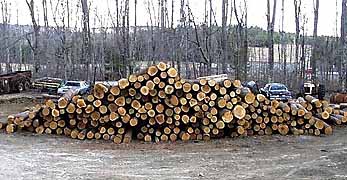
|
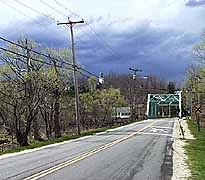
River Willows
|
Cornish said, "The trees were dead."
"Are you a licensed forester?" the CEO asked.
"Nope. Are you?"
"No."
"Well there." |
| Inky rain clouds have been hide and seeking us all day. I put
out some laundry to bait the sky, but it just smiled sunshine.
At lunch I asked Max if he had any spoiled hay he'd part with,
and we loaded Ebba with loose bedding as showers rode the western
view. A sprinkle in passing. More sun. |
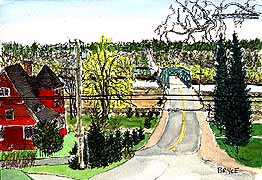
Corner Willow
|
I might have known Coyote was out skylarking. Instead of off-loading
the hay, I chased other wisps. Jawed with David about masts and
spars. A roll of thunder went through, followed by a brief downpour.
That was when I chose to pitch hay, and, of course, the loose
straw stuck all over Ebba, like a spring roll in the horse pasture.
You have to love a playful climate.












